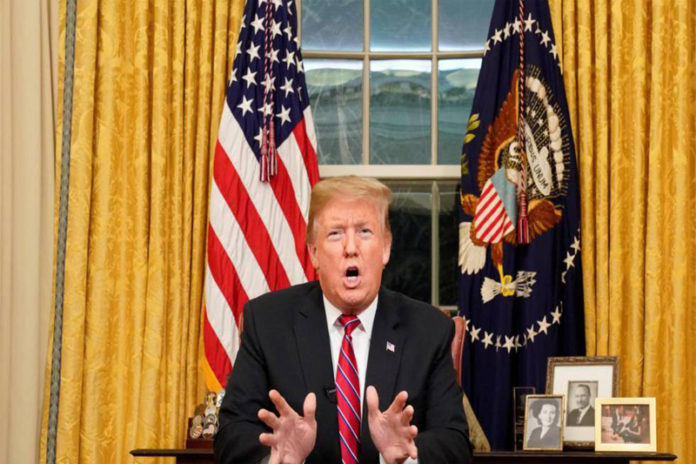President makes first pronation of the Oval office since he came to power to charge the more than 5 billion dollars he wants for the work on the frontier. Opposition, who dominates chamber, refuses and also responds on TV
Paul Gentry
U.S. President Donald Trump used for the first time since arriving to power the expedient of speaking to the nation on TV directly from the Oval office of the White House. The prime-time message this Tuesday (already Wednesday in Brasilia) was an effort to try to convince Americans that there is a “growing humanitarian and security crisis” on the country’s border with Mexico, “a crisis of the heart and soul,” and of That needs to get from Congress the more than 5 billion dollars that complains to raise the wall with the neighboring country. Just so, he said, could put an end to the government’s partial closure, which on Sunday came into its third week because of the lack of agreement with the Democrats regarding the budget. Trump threatened to keep the blockade for “months and even years” and blamed the oppositionist who now controls the chamber.
“The government is closed for one reason: the negative of the Democrats to finance border security,” Trump said, at the first time he addressed the citizens in a televised message at the maximum hearing time. After passing a series of crimes allegedly committed in the U.S. territory by illegal immigrants in recent months, he asked, “How much more American blood should we shed for congressmen to do their job?”
The President insisted, as a few days ago, that the wall that wants to lift “will be steel and not concrete, as the Democrats want.” He also accused the opposition of being hypocrites by calling the wall of immoral. “Why do they raise walls in their homes?” he asked. “It’s not because they hate the outside, but because they love the inside,” he replied.
“It is an election between the right and the wrong, between justice and injustice. This is about fulfilling our sacred duty to the American citizens we serve, “he said.
Trump did not present any new arguments in favour of one of his main campaign proposals. He made a speech in a serene tone, but he was alarmist. It resorted to formulas, which fall so well on their bases, to cite the alleged entry of criminals and drugs across the border. Some of the arguments that quoted with data, some of them somewhat defensable, such as the direct relationship that establishes among the 300 deaths of Americans caused by heroin per week and illegal immigration that crosses the southern border (most opiates in Countries see from China by post or Canada, or in cars by border crossposts with Mexico).
He also made a point of saying that the wall “will be financed indirectly by the great trade agreement with Mexico.” A controversial statement to coincide with his campaign promise that it would be the Mexican government that would pay the wall: the eventual benefits of the new trade agreement with the southernmost country, which has not yet been approved by Congress, would come in the form of falling rates For undertakings or wage increments for workers.
Pressure on the Democrats
The speech, which lasted about eight minutes, added to the announcement that it will travel to the border this Thursday, assumes an attempt to press the Democrats, who refuse to approve the funds needed for a project that the leader of the new majority in the lower chamber, Nancy Pelosi, directly qualifies as immoral. Shortly after Trump, Pelosi and Chuck Schumer, leader of the Senate minority Democrat, also went on TV together immediately after the president to retap their arguments.
“The fact is that President Trump has decided to take as hostages the critical public services such as the health, safety and welfare of Americans and retain the payroll of 800,000 innocent workers,” Pelosi said. “He wants to force the taxpayer to finance an expensive and ineffective wall that he always said would make Mexico pay,” he recalled.
The Democrats passed the camera of representatives a law to provide the necessary monies to the other agencies affected by the government’s closing, while negotiations on border security continue. The President, who would have to give a green light to the bill in the unlikely event that he passed the Senate of Republican majority, has warned that he would use his veto power to curb the initiative.
The Trump government argues that the situation at the border is of total crisis, both in security and humanitarian, and threatened to resort to a declaration of “National emergency” to build the wall. If you carry out the promise, it would be an extraordinary and very unorthodox use of the presidential powers, which would probably lead to a new chapter of your clash with the judiciary.
The measures implemented by the U.S. government contributed to a saturation of the host centers of asylum-seekers and two minors died while in federal custody. The number of people barred by illegally crossing the border declined dramatically (from 1.6 million in the year 2000 to 400,000 in 2018), but are now mostly families, not individuals alone, who cross the border. This, dening the critics, combined with the restrictive measures imposed by the Government, caused the overload of host services at the border.
In addition to quoting the opioid crisis and the crimes, Trump also cites that terrorists cross the border, a statement to which the State Department itself ensured that there is no “credible evidence”.
Unlike Brazil, the retransmission of the pronation by the TVs is not compulsory. The decision of the major television chains to disclose live and in prime time the message of the president aroused a heated debate. Providing space on the grid for a president to address the nation would normally be a logical decision for broadcasters ‘ executives, but Trump’s virulent discourse, which especially in the migratory debate relies on false information, and his insistence on Referring to journalists as “enemies of the People”, led some to wonder about the convenience of doing so, for ethical reasons.















